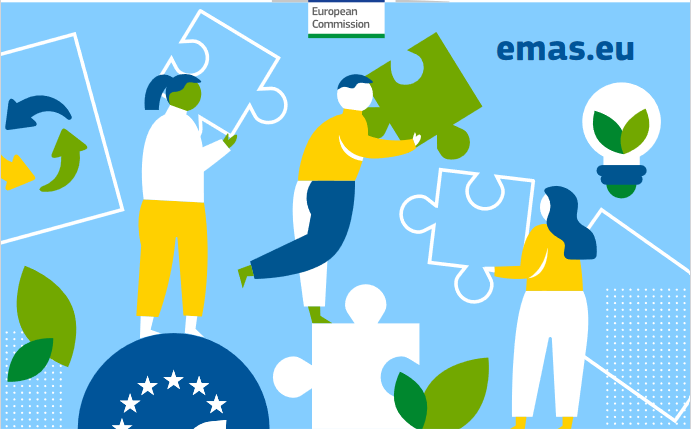
Titled "People: your best resource in environmental management. How to involve them?" the webinar explored the powerful role people play in driving environmental change within organizations, guiding them towards sustainability and circular business practices. EMAS is strategically designed to empower sustainable transitions within organizations, with fostering employee engagement and involving other interested parties explicitly outlined in its Regulation. The webinar provided insights into effectively involving staff and stakeholders in environmental management, the supportive role of EMAS, and highlighted best practices.
The webinar, attended by nearly 240 participants, commenced with an introduction by Paola Migliorini, Deputy Head of Unit B1, DG Environment, European Commission. Subsequent presentations included Alexandra Vandevyvere from Circular Flanders discussing organizational and behavioral changes, Riku Alkio, the founder and CEO of Seppo, exploring the transformative power of gamification for stakeholder involvement, Mariana Nicolau from the Collaborating Centre on Sustainable Consumption and Production (CSCP), aplplying insights from behavioral sciences to the topic of circular economy, and Maria Passalacqua, the director of Club EMAS, presenting EMAS and its requirements for stakeholder involvement. The main segment featured insights from four EMAS organizations, sharing their experiences with stakeholder and employee involvement. Find all the presentations here.
Alexandra Vandevyvere from Circular Flanders focused her presentation on circular procurement, providing insights on initiating transformative change within administrations. Her key points included the importance of identifying key stakeholders, interested parties, necessary roles, and responsibilities and building a strong network that extends the actions beyond the organization's boundaries. She, as well as Mariana Nicolau from CSCP, emphasized the need to shift mindsets, foster good habits, and invest in the education, training, and engagement of employees. To facilitate this, Riku Alkio from Seppo introduced an innovative approach using gamification. Gamification, as presented by Alkio, adds an element of fun and ease to the change process, creating a relaxed atmosphere while making concepts tangible and contextually relevant.
Just as Vandevyvere emphasized identifying stakeholders, fostering collaboration, and engaging employees, EMAS pursues a similar objective. Next to the continuous improvement of environmental performance, EMAS aims for an open dialogue with the public and other interested parties and the active involvement of employees.
The four EMAS organisations showcased different approaches and interesting initiatives to facilitate the stakeholder’s dialogue. Among them, the Spanish design company La Page Original introduced their tool for eco-design called Bluetool. It is a public tool to assess the sustainability and eco-efficiency of designs. Notably, Bluetool highlights the actors involved throughout the design process and aims to impact each one specifically. It encourages designers to adopt an eco-design way of thinking, influencing the professionals they engage with throughout the process, such as printers, producers, and distributors. This fosters collaborations towards a circular economy. Clients are engaged through a trusted methodology that allows them to actively contribute to solutions, enhancing the user experience with the product. So far, over 1,200 projects have already been assessed with Bluetool.
ST Microelectronics, an Italian semiconductor company with global presence, and Epson Ibérica shared how they're making a big impact by educating the younger generation about sustainability. ST Microelectronics actively collaborates with primary schools, conducting lessons that involve experiments, games, cartoons, and sharing their junior environmental statement. This approach not only educates children but also influences their parents, creating a ripple effect of awareness.
Epson Ibérica is driving the Green Schoolyards campaign, partnering with two local environmental associations and 58 schools to promote tree planting in educational centers. They also presented innovative partnerships, such as collaborating with Ibis Styles hotels, circular economy materials manufacturers, and design schools in Barcelona, Lisbon, and Madrid. Together, they rethink and redesign spaces in hotels using circular economy principles. In the fashion sector, Epson Ibérica works with Seaqual and design schools in Barcelona and Lisbon. Student designs are printed on recycled fabric by Seaqual, using plastics collected from the sea transformed into polyester threads. These initiatives showcase a multifaceted commitment to sustainability, involving education, environmental consciousness, and creative partnerships across different sectors.
In terms of employee involvement, the Belgian communication group VO outlined their innovative approach. They've established a transversal task force that allows everyone at VO to actively participate in management decisions. The company has six cross-functional task forces, and employees can join these voluntarily. To ensure alignment with the agency's values, decisions made by these task forces undergo review by a congruence committee. This approach harnesses collective intelligence to drive the company's transition towards sustainability.
VO is committed to supporting employee engagement by providing training and support. They've observed that when the involvement of employees in environmental management becomes an official practice, as is the case with EMAS, employees recognize its impact on the organization's actions, leading to increased motivation to actively participate. This integration of employee involvement not only fosters a sense of collective responsibility but also promotes a harmonious transition towards environmentally conscious practices.
If you want to learn more about how to involve people in implementing EMAS, have a look at our case study Involving employees in implementing EMAS.
All presentations to download
Details
- Publication date
- 27 November 2023
- Author
- Directorate-General for Environment
